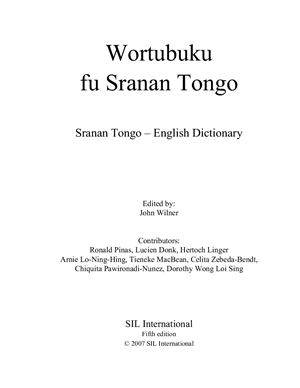Product desciption
Wortubuku Fu Sranan Tongo Sranan Tongo English Dictionary John Wilner by John Wilner instant download after payment.
SIL International, 2007. — 216 p.
Fifth editionIntroductionSranan Tongo is a language spoken primarily in the coastal regions of Suriname, South America. It is a creole language whose development began in the 17th century with the importation of slaves from West Africa. At various times Suriname was controlled by both Great Britain and the Netherlands. The languages of these people, plus those of the others who controlled the slave trade, had significant impact on the development of the language. Suriname gained its independence from the Netherlands in 1975, but Dutch is still the official language of the country and, more significantly, the language of education.
English is widely used in the media, especially television, and enjoys high status. These two languages continue to impact the development of Sranan Tongo. In compiling a dictionary, one is confronted first of all with having to decide whether a given word belongs in it. Suriname is a multilingual society and Surinamers routinely borrow words from one language or another in everyday speech. In fact, they seem to revel in it. As a result it is not often easy to
determine if a word has been adopted into the language. The border between Sranan Tongo and Suriname Dutch in particular is difficult to determine.
Another challenge in compiling the dictionary is deciding on how a word is to be spelled. In this
dictionary we have strived to follow the official spelling for Sranan Tongo which was adopted by the government of Suriname in Resolution of 15 July 1986 no.
4501. In spoken Sranan Tongo parts of words are often elided. For example, one will normally hear mi nak en, instead of mi naki en ‘I hit him’. The commission charged with formulating the rules for writing Sranan Tongo gave as its first guideline that words are to written in their full form. Thus naki is the correct spelling for ‘hit’.
Some words, however, are almost never heard in their full form, or else only under special circumstances. The official spelling allows for use of an apostrophe under special circumstances to indicate that part of a word has been elided. This is intended to give writers, and especially poets, freedom in crafting their work. A quick look at published wordlists and other written materials shows the apostrophe being used to indicate normal pronunciation. For example, in the Woordenlijst published by Stichting Volkslectuur we find at’oso instead of ati-oso ‘hospital’. Since this dictionary is intended for people trying to learn the language, and since Sranan Tongo is primarily a spoken language and not written, the headword is written in a form the user is more likely to encounter. In some cases a word used in its full form will have a different nuance than the word spoken in an elided form, such as mu, mus and musu. In cases where an elided form seems to be the preferred form, or where there is a difference in nuance between the elided
and non-elided forms, all forms have been included.
A similar challenge comes in deciding what constitutes a compound word. The spelling commission recommended that combinations of words be written together whenever the parts in combination have a different function or meaning than when they are written apart. For example, ala dei means ‘every day’ and is written as two words; aladei means ‘everyday, commonplace’ and is written as one word. The challenge comes in that the language of education in Suriname is Dutch, which typically combines words to make compounds. As a result, educated Surinamers tend to write words as compounds (e.g. wansma ‘someone’, bromkisiri ‘flower seed’, agumeti ‘pig meat’) because they are written as one word in Dutch (iemand, bloemenzaad, varkensvlees). These words, and hundreds like them, can arguably be written as
two words according to the spelling commission recommendation (wan sma, bromki siri, agu meti). One even sees the name of the language spelled two ways: Sranan Tongo and Sranantongo. The user of the dictionary will doubtless find such inconsistencies in the many written texts that are available, and possibly even in the text in hand.


